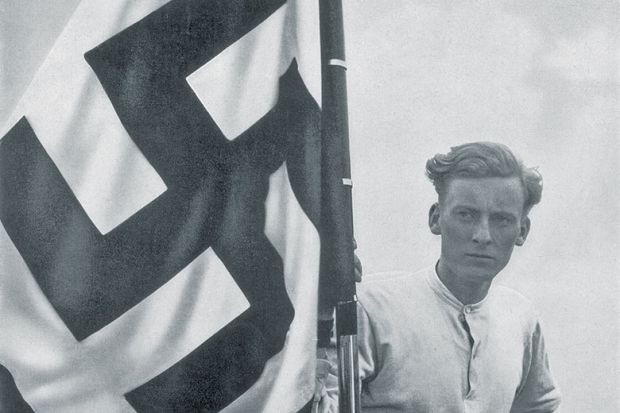According to the author, “no one has ever yet attempted to map out what might be called the mental universe in which Nazi crimes took place and held meaning”. “Research into the culture of Nazism,” he adds, “all postdates 1995”. His book is, therefore, the first “comprehensive study of Nazi normativity”.
Yet on my bookshelf sits Yale’s 1999 reprint of Max Weinreich’s seminal work of 1946, Hitler’s Professors: The Part of Scholarship in Germany’s Crimes Against the Jewish People, alongside a large number of volumes by the great cultural historian George L. Mosse, including Nazism: A Historical and Comparative Analysis of National Socialism and Nazi Culture: Intellectual, Cultural and Social Life in the Third Reich, as well as Léon Poliakov and Joseph Wulf’s important collection of documents from 1959, Das Dritte Reich und seine Denker (the Third Reich and its thinkers). Together with more recent works in the vein of cultural and intellectual history by Claudia Koonz, Raphael Gross, Jeffrey Herf, Alon Confino, Boaz Neumann, Lothar Kroll and Christopher Hutton (several of them published by Harvard), this amounts to a substantial list of forebears where a cultural history of Nazism – one that focuses on the meanings that Nazism had for its adherents – is concerned. Many contemporary thinkers’ analyses of Nazi thought, most notably Aurel Kolnai’s extraordinary book The War against the West, are also foundational for this sort of approach.
Chapoutot mentions some of these authors in his introduction, but the extent to which he is indebted to them is underplayed. More irritatingly, The Law of Blood’s claims to originality are overblown. That said, it provides a thorough review of Nazi texts of all varieties, from medical ethics to religion, with a strong emphasis on Nazi attitudes to law. Many of these texts are well known, such as Hitler’s speeches, Joseph Goebbels’ diaries and Rudolf Höss’ autobiography. Yet many others are much less known and their analysis here is welcome. This applies especially to ideological indoctrination tracts such as Jüdische Moral, a paranoid antisemitic text of 1943.
Chapoutot argues that a close and deep reading of Nazi texts indicates an emphasis on three cardinal points or “foundational categorical imperatives”: procreation, building and strengthening the Aryan race; fighting, because all life is struggle, and war, especially racial war, strengthens the Volk; and reigning, ensuring the enduring victory of the Aryan race and bringing History – as the history of struggle – to an end. These points are well developed and the argument well made. It is, however, disappointing that the place of the Holocaust in the Nazi worldview receives little attention until towards the end of the book. Although the focus is on the Nazi mental worldview in general, it is clear that an obsession with “the Jew” is ubiquitous throughout Nazi writings on all subjects, from law to medicine to criminology.
The Law of Blood is a useful addition to the literature on Nazi ideology. Anyone familiar with the historiography of Nazism and the Holocaust will not be surprised, even if they are not familiar with all of the texts being analysed.
Offputting claims to originality aside, readers will find much here to further their understanding of what Nazis thought and why they behaved the way they did.
Dan Stone is professor of modern history at Royal Holloway, University of London.
The Law of Blood: Thinking and Acting as a Nazi
By Johann Chapoutot
Harvard University Press
512pp, £27.95
ISBN 9780674660434
Published 27 April 2018
Register to continue
Why register?
- Registration is free and only takes a moment
- Once registered, you can read 3 articles a month
- Sign up for our newsletter
Subscribe
Or subscribe for unlimited access to:
- Unlimited access to news, views, insights & reviews
- Digital editions
- Digital access to THE’s university and college rankings analysis
Already registered or a current subscriber? Login








